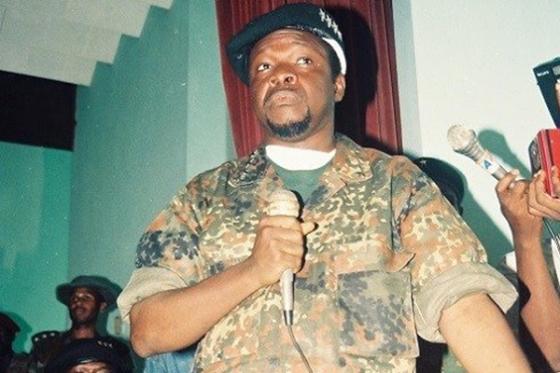Liberian Warlord Dies without Justice for Victims

Professor Alhaji G.V. Kromah during his warlord days.
Professor Alhaji G.V. Kromah, the former Liberian warlord who did not face justice for his crimes is dead.
He died at the age of 68 in the early morning hours of January 18, following a protracted period of illness from a stroke which left him paralyzed.
The warlord, whose United Liberation Movement of Liberia for Democracy (ULIMO) forces terrorized the country during its brutal 14-year civil war, died without acknowledging his wrong. Rather, he insisted that his actions were in defense of his people.
General Kromah was a Liberian journalist, writer, before he became the leader of the ULIMO faction during the Liberian Civil War.
His ULIMO rebel faction was named in Liberia’s TRC Report for having committed over 11,500 various forms of abuses and atrocities including forced displacement, killing, rape, property destruction and torture among other alleged criminal actions. ULIMO was allegedly responsible for committing about 7% of overall atrocities recorded in the TRC Final Report and its leaders were recommended for prosecution for human rights and international humanitarian law violations and war crimes.
However, he died without being tried as recommended by the TRC. The Liberian government of President Ellen Johnson Sirleaf and now George Weah have never prosecuted its war criminals despite a recommendation to do so more than 10 years ago.
Former warlords retain positions of power and privilege and witnesses are reluctant to come forward.
Both Ellen and Weah rebuffed pressure in establishing a war crimes court to prosecute those accused of committing human rights violations and atrocities during the war.
However supporters of former President Sirleaf and her successor President Weah say attempts to prosecute alleged war and economic criminals could destabilize the fragile peace, while others say justice and accountability are the best remedies for reconciling Liberians.
Before the war, Kromah was a special assistant to the late Vice-President Bennie Warner and later Assistant Information Minister during the regime of President William R. Tolbert, Jr., before becoming Director General of the Liberia Broadcasting System in 1982 and Minister of Information in 1984 under President Samuel K. Doe.
He went into exile in June 1990, months after the civil war began in Liberia. He later co-founded the United Liberation Movement of Liberia for Democracy (ULIMO) a resistance armed group that also helped to force wartime President Charles Taylor to a negotiating table that eventually brought a tangible political solution to the Liberian conflict.
ULIMO split into two factions in 1994, with Kromah leading one faction known as ULIMO-K. Its power base was in northwestern Liberia, in and around Lofa County.
The first half of the country's 14 years of civil war saw a concerted campaign against Mandingoes and Krahns who were considered supporters of the late President Samuel Doe, a member of the Krahn ethnic group.
Kromah later forged a union with the Krahns, forming the United Liberation Movement for Democracy in Liberia (ULIMO), with the declared objective of rescuing Krahns and Mandingoes from ethnic cleansing instituted by the NPFL's Gio-Mano fighters, declared enemies of Krahns and Mandingoes who were similarly persecuted by the military regime of late President Samuel Doe.
ULIMO soon split along ethnic lines - Mandingoes and Krahns. Kromah became leader of ULIMO-K (for Kromah) while the Krahn warlord Roosevelt Johnson led ULIMO-J (for Johnson). Bitter rivalries ensued between the two groups. In one of the surprising twists in the Liberian crisis, Kromah forged an alliance with Taylor's NPFL against the Krahns. In April 1996, Kromah and Taylor, uniting their rebel forces under "Government Forces", and with the open backing of Nigerian commanded ECOMOG, attacked the Krahns in Monrovia, overtly to arrest Johnson for an alleged murder. The city war, which lasted until May 1996, left over 3000 people killed, according to UN figures. Their forces, other rebels, along with ECOMOG, thoroughly looted the city and millions of dollars worth of property were lost. What remained of Monrovia, after a series of NPFL attacks such its 1991 Operation Octopus, which sought to drive Liberians into the sea, was destroyed. Thousands of Liberians and foreigners fled the city in leaking boats.
As it gained military strength, ULIMO-K began a series of vendettas against non-Muslims around the country, mainly in Nimba and Lofa Counties. It became a vicious cycle of revenge that earned ULIMO-K notoriety.
Kromah was one of the 13 candidates that contested the July 1997 elections, coming third but with no significant numbers of seats for his paralyzed All Liberia Coalition Party. Following Charles Taylor's victory, Kromah was appointed head of the Reconciliation Commission, but he was forced to escape after the horrific killing of opposition politician Samuel Dokie, his wife and two others. Mr. Kromah, a Muslim, married to a Christian.
Meanwhile, the administration of George M. Weah has announced the death of Prof. Kromah, a former member of the Council of State of the Liberian National Transitional Government.
"Before falling sick, Prof. Kromah was an active member of the faculty of the University of Liberia, where he helped mold the minds of many of the country's youths. President Weah conveys his deepest sympathy to the Kromah family and all those affected by Prof. Kromah's passing. Despite the mixed views about the role of the learned professor in Liberian history, there's no denying that he is a pillar of strength to many of his supporters," the Executive Mission said in a release.
The release added that the President has urged the grieving family to take solace in the Almighty Allah during this difficult time.

